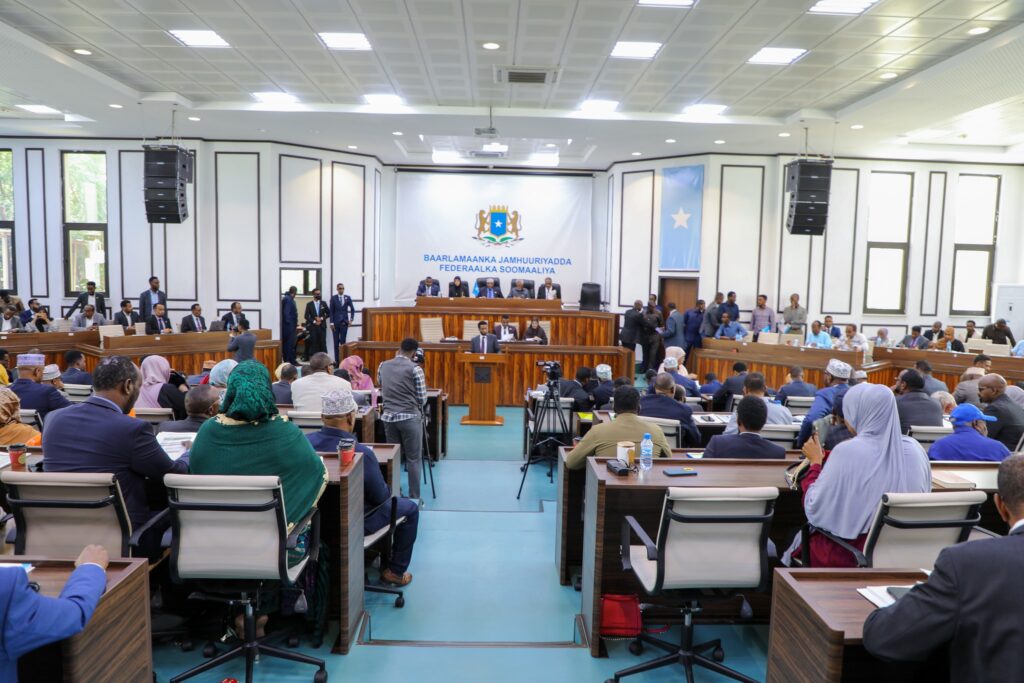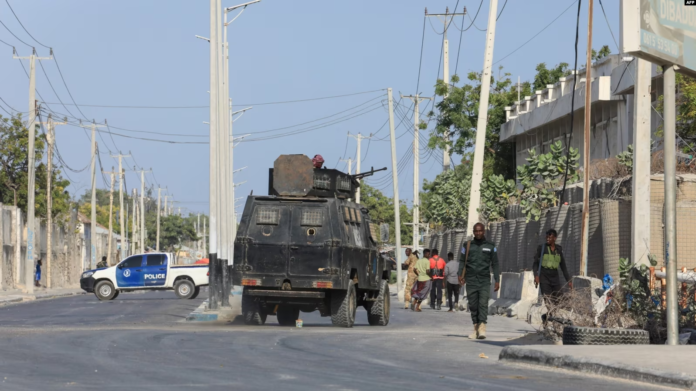MOGADISHU (KAAB TV) – In the aftermath of the devastating terror attack that claimed the lives of over 40 soldiers and injured 73 others at a military training camp in Mogadishu last week, Somalia’s lawmakers and families of the soldiers are on a quest for answers: who exactly plotted the attack and who are the traitors within?
The brazen attack, carried out by a lone suicide bomber, targeted the 14 October brigade of the Somali National Army, leaving the nation in shock and raising serious concerns about security lapses.
Al-Shabaab was quick to claim responsibility for the attack, but critical questions remain unanswered, leaving a cloud of suspicion hanging over how the assailant managed to infiltrate the heavily fortified military base without detection.
Speaker of the Lower House of Parliament, Adan Mohamed Nur (Madobe), has unequivocally pointed to the involvement of an inside traitor, calling for an urgent and thorough investigation.
“I have no doubt that the bombing of Jaalle Siyad military camp was facilitated by an insider. A clear answer is expected from the Armed Forces,” added Madobe during a press briefing the day after the attack.
As the parliament began discussions on the incident two days later, lawmakers voiced their apprehensions, demanding a full inquiry into the matter.
“A disaster that happened as planned.”
MP Mohamed Abdi Maareye expressed the multitude of questions surrounding the attack, emphasizing that the incident occurred at Jaalle Siyad military camp, considered one of the most secure places in the capital.
“The act of terrorism that claimed the lives of many soldiers has left us with numerous unanswered questions. Why was the well-trained army, already engaged in combating Al-Shabaab, deployed there when they were not new recruits?” he inquired.

Adding to the growing suspicions, the pro-government and private media remained eerily silent about the attack. Lawmakers suggested a meticulously planned operation aimed at censoring media coverage through threats or bribery.
MP Maareye says he was baffled by the government-supported media’s silence, urging the parliament to swiftly establish a committee to investigate the matter.
“It shows how the thing was perfectly planned,” he added.
MP Abdirashid Hidig further stressed the need to scrutinize government employees and their possible links to extremist groups. He called for a reliable system to confirm the trustworthiness of those working for the government, highlighting the importance of protecting officials and the public alike.
The attack’s grim reality was described by MP Mohamed Barre as “a disaster that happened as planned.”
On her part, MP Sareedo Mohamed Abdalla pointed out that the soldiers were possibly targeted based on their clan identity, suggesting that the heinous act was perpetrated by individuals within the government who must be held accountable for their crimes.
In the wake of the tragedy, families of the fallen soldiers took to the streets in Marka, Lower Shabelle region, demanding the arrest of officials they believed were responsible for the security failures leading to the attack.
The government responded by announcing the arrest of three officers: Abdullahi Dhabow (Abdullahi Dheere), the head of intelligence for the army; Abdullahi Abdi Dawle from military intelligence; and Abdinasir Sharif Abdi, secretary to the commander of the infantry. However, Abdi Ali Raage, the deputy commander of the 14 October Brigade, remains a suspect but has not been apprehended.
The 14 October Brigade was formed after a major terror attack at the Soobe intersection in Mogadishu on October 14, 2017. Comprising soldiers from the Rahanweyn and Biyamaal clans, it played a vital role in liberating the Lower Shabelle region from Al-Shabaab’s control.
NISA leadership remain key suspect
Despite this success, inter-clan conflict between Habargedir of the Hawiye clan and the Biyamaal in Lower Shabelle continues to claim lives, exacerbating security challenges. A security source revealed that the soldiers initially resisted orders to move to Mogadishu for training, but coercion, including threats of salary cuts, forced their compliance on May 18.
But their journey was met with an Al-Shabaab ambush, resulting in injuries to several soldiers.
Renowned as a stalwart defender of the Lower Shabelle region’s interests, the 14 October Brigade stands as a well-armed and highly trained force.
Amidst suspicions, the main focus remains on the leadership of NISA (National Intelligence and Security Agency). Lawmakers demand the inclusion of NISA director Mahad Salad, a Habargedir, into the list of suspects to be investigated.
President Hassan Sheikh Mohamud’s reluctance to comply has only deepened suspicions, leaving affected families, clans, and the public questioning the government’s commitment to transparency and accountability.
Clan rivalries and the persistent infiltration of Al-Shabaab into the government and security forces continue to undermine Somalia’s security, posing unresolved challenges that demand urgent attention.
As families and lawmakers search for answers to identify the true traitors behind the attack, there are growing concerns that this tragedy may fade into oblivion, leaving the pain to persist in the hearts of those affected.


